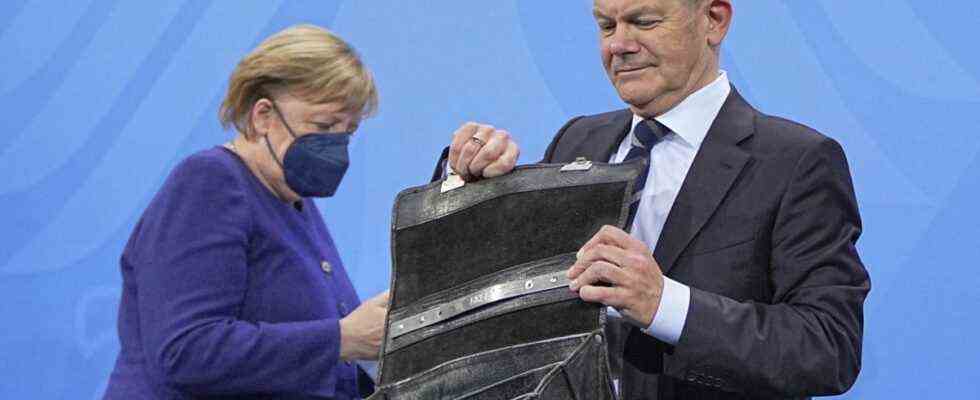Angela Merkel likes to work with tables and statistics. During the financial crisis, she always had the current “spreads” ready, ie graphics that show the difference in the interest burden of individual countries. Over the years, she switched from paper printouts to the tablet and was able to call up freshly updated curves about the course of the infection in Germany or individual regions at any time. On Tuesday evening, too, the Chancellor presented her guests with lots of tables to illustrate the drama of the pandemic to be expected in the next few days. SPD chancellor candidate Olaf Scholz and the leaders of the Greens and FDP were impressed. But what follows from this has been unclear for days.
Merkel is said to have pushed for a massive reduction in contacts. The Chancellor would like to have something similar to the former federal emergency brake, which set benchmarks in the infection process, which inevitably led to further restrictions. It is unclear whether a new lockdown was actually in question, but it is conceivable. This is supported by the date of the meeting, one day before the end of the pandemic emergency, which has now made a number of particularly massive restrictions legally impossible. Less than 24 hours after visiting his future workplace, Scholz presented several initiatives, including a new crisis team and a new advisory committee with experts from departments dealing with Corona and its consequences. He did not announce any new measures.
Since then, there has been a back-and-forth of accusations, declarations of intent and demands between the executive government and the parties of the future government, without anything actually changing. Above all, the Union part of the old government warns and presses, obviously also tormented by the accusation that they reacted too late to the fourth wave that was building up. The traffic light parties, on the other hand, want to wait for the new Infection Protection Act to take effect and are urging the federal states to exhaust the legal framework given. The SPD, Greens and FDP must fear that any further correction would be seen as an admission that they underestimated the seriousness of the situation.
“It’s serious folks, it’s serious.”
Green leader Annalena Baerbock caused a stir when she announced on Wednesday evening that the traffic lights had set a deadline of ten days. Then you want to see: “Have we come far enough with the protective measures?” This period seems long enough. Merkel reacted on Thursday: You have to be careful not to overload the hospitals. “Every day counts here,” she said. On Friday, the head of the Chancellery, Helge Braun, added: An emergency stop is necessary. “76,000 infections in one day means that of the people who became infected yesterday, around 600 will die in the next few weeks.”
The acting Federal Minister of Health Jens Spahn said on Friday that there were “different assessments at certain points” with regard to the corona situation between the incumbent and the future government. Above all, he cannot understand the discussion about mandatory vaccinations at the moment – because it would by no means take effect quickly enough to break the current fourth wave of pandemics. The compulsory vaccination should therefore “not be the subject of these days”. Instead, more contact restrictions are needed – and a quick prime ministerial conference. It is also a signal: “It is serious, people, it is serious.”
These days in Berlin it’s not just about the number of infections and intensive care beds, but also about the sovereignty to interpret the current situation. This affects the outgoing Minister of Health in particular – Jens Spahn is no longer well-off in large parts of the public, he must now hand over his office, while the pandemic in Germany threatens to surpass everything that has gone before – not the legacy that Spahn has envisioned: yet in October he initiated the abolition of the epidemic emergency. That should have been the perfect end to his tenure. Now the state of emergency has been abolished, but the virus prevents the narration of Spahn’s accomplished mission.
“There is a crisis team,” says Spahn
Yet there is a struggle in his home about how the minister’s work will be perceived in retrospect. Above all, the establishment of new crisis committees announced by future Chancellor Olaf Scholz is upsetting many in the ministry. Because it is not as if there are no crisis teams, on the contrary. “The crisis team that exists will meet next week for the 99th time, I think,” said Spahn on Friday. There are also the Prime Minister’s Conferences and discussions with the health ministers of the federal states – the latter often up to five times a week. Exchange at work level not even included.
In any case, he does not believe “that the decisions that have to be made will not be made due to a lack of scientific support”. This can hardly be interpreted otherwise than as a reproach to the traffic light parties, who have so far not been able to bring themselves to tough new measures. The accusation of inaction has accompanied Spahn for a long time, he likes to point out that many of the measures that he considers necessary are decisions of the federal states. 2 G? He already called for it in the summer, but it was just not enforceable. Booster vaccinations? He reminded me months ago.
It is still open who should succeed Spahn. The only thing that is clear is that the Ministry of Health will fall to the SPD. After all, in Karl Lauterbach she has a man who is interested in the job. However, the gender parity sought by Scholz in the cabinet and Lauterbach’s manageable popularity in his own party could prevent his appointment. After all: Lauterbach is one of the few in his guild who is just as enthusiastic about tables and statistics as the Chancellor.

